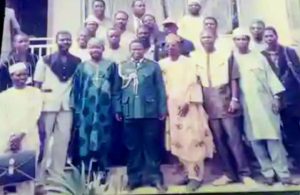

By Dada Ahmed.

The pioneer Military Administrator of Kogi State,Col.Danladi Zakari, flanked by the pioneer journalsts in the state,34 years old ago in Lokoja.
On a sweltering afternoon in Lokoja, an ageing journalist once whispered to a younger colleague, “We were here when there was nothing but paper and typewriters.” That simple remark captures the human struggle and sacrifice of Kogi’s pioneer journalists during the state’s creation on August 27, 1991. Beyond the ink and microphones, these were men and women endured the delicate demands of their noble profession to keep the torch of information burning.
When Kogi was carved out of Kwara and Benue States, it inherited little in terms of media infrastructure. There was no state-owned newspaper and only a skeletal broadcasting structure. The challenge was enormous: to build not only the institutions of government but also the instruments of communication that would knit together a state of multiple ethnicities and divergent cultures.
Journalists became the bridge between the government and the governed. Early correspondents of national dailies such as Mal. Yahaya Mayaki of Radio Nigeria, Lucy Nwakwere of the Daily Times, Gabriel Bamidele Obajaja of the News Agency of Nigeria (NAN), and Femi Johnson of the Daily Sketch were the journalists that laid the foundation of reportage of developments in Kogi state. Others like Wole Ayodele (Vanguard), Tims Ejiga and late Emmanuel Eguaba,(Radio Kogi), and this writer, also of NAN, chronicled events that placed Kogi on the national map. They reported on infrastructure, highlighted community struggles, and interpreted government policies for ordinary citizens.
The Nigeria Union of Journalists (NUJ), Kogi Council, became both shield and spear. From its press centres in Lokoja, it coordinated news coverage, defended journalists against intimidation, and made Press Weeks not just platforms for awards but also for engaging policymakers and cementing journalism’s role in governance.
During the turbulent years of military dictatorship in Nigeria and the early days of civil rule, journalists in Lokoja stood out as defenders of democracy. Many endured harsh realities in the pursuit of their lawful work. One unforgettable incident was the brutal attack on Mr. Alifa Daniel, who was bathed with acid during those difficult times. Yet, despite such dangers, the pens of journalists never ran dry.
These members of the fourth estate of the realm also championed socio-economic development of the state from the embryonic stage to maturity. Their consistent reportage of the fledgling state’s challenges and prospects often compelled authorities to act in line with public expectations. Features on Kogi’s agricultural potential and mineral wealth drew attention from investors and policymakers. In this way, journalists became engines of economic and social discourse.
In rural towns such as Dekina, Kabba, and Okene, stories of women farmers, struggling teachers, and unemployed youths reached government tables because journalists carried them. By amplifying these voices, reporters positioned themselves as catalysts for inclusive governance and development.
Beyond politics and economics, Kogi journalists documented cultural festivals, traditional institutions, and the lived experiences of its diverse peoples. By doing so, they built archives of identity and unity, preserving heritage while celebrating diversity.
Yet the irony is stark: despite their sacrifices, journalists in Kogi remain largely unsung. Many now bemoan their living conditions, while others nurse the hope that one day their contributions will be adequately acknowledged. Families of departed correspondents mourn in silence. Those of them living with pronounce ill-health or physical disabilities have become big burden to their family and sympathetic colleagues while the society they once served often forgets them too quickly.
The advent of digital media has, however, altered the terrain. Online news platforms such as The Reporters, Kogi Reports, Nigerian Post, and other social media channels now complement traditional outlets. This transformation, pioneered by both veterans and young reporters, ensures that Kogi’s narratives are instantly accessible to the world, expanding influence and visibility.
Through editorials, press conferences, and in-depth analysis, journalists have also influenced policy debates,ranging from advocacy for improved education, healthcare, and infrastructure among others.They have often provided the intellectual framing for government priorities, even when unacknowledged.
Importantly, journalists have collaborated across ethnic, political, and generational divides. At the NUJ Press Centre in Lokoja, for instance, an Ebira journalist works side by side with an Igala and an Okun colleague. This quiet unity demonstrates what is possible in a state often fractured by politics of identity.Journalism thus becomes a model of the harmony Kogi aspires to.
Today, as Kogi clocks 34, calls are growing for institutionalized recognition of journalists. The thrust of the clarion call for filling this missing gap has been that, state honours, memorial lectures and proper documentation of the contributions of journalists in Kogi state would not only ginger interest in the profession but also attract more hands into journalism. Just as politicians, civil servants, and businessmen are celebrated, journalists who cover these events, also deserve a place in the pantheon of state builders.
This is because from mere jotters and biros in 1991 to today’s digital tablets, journalists have remained central to Kogi’s social, economic, and political journey. They chronicled the birth of the state, nurtured its growth, defended its democracy, and amplified its aspirations. If indeed nations are built by those who tell their stories, then Kogi owes its very soul to these unsung architects,the journalists.
Without prejudice to the role of the founding fathers of Kogi State leading to the creation of the state ,it is apt to say that improved recognition for journalists, for the positive impact they have made and are still making for the development of the state will be a right thing in the right direction.
Ahmed, a retired Assistant Editor-in-Chief with NAN, publishes The Reporters.

